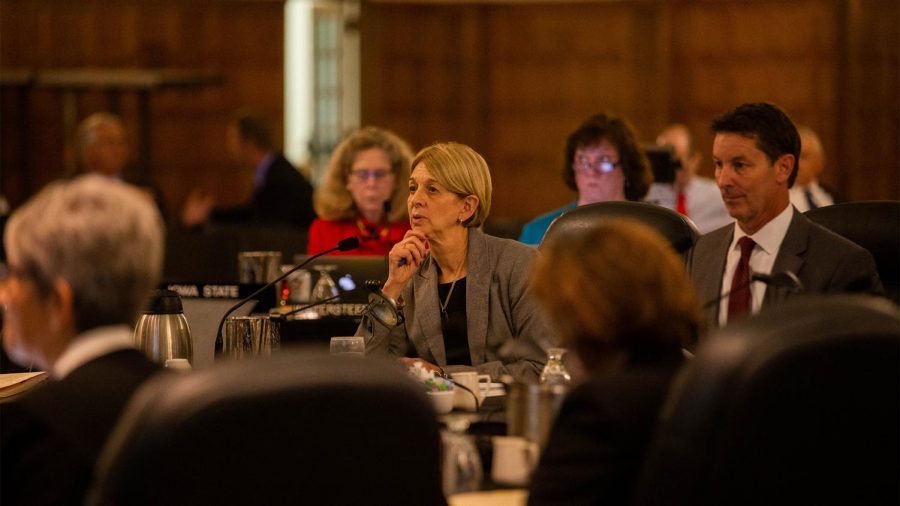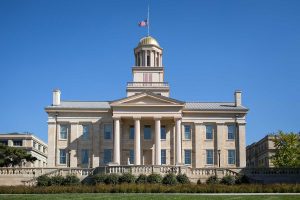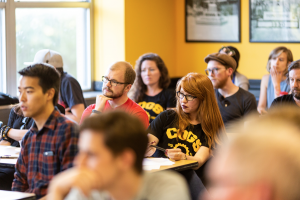‘There’s no joy’ in closing centers, Provost Curry tells Iowa Board of Regents
The state Board of Regents will consider approval of five center closures in November, with the UI Labor Center among them.
UI interim Provost Sue Curry speaks to the state Board of Regents during the Academic Affairs Committee meeting in the IMU on Wednesday, Sept. 12, 2018.
September 12, 2018
After University of Iowa President Bruce Harreld announced in April the UI would consider closing certain centers and institutes in light of reduced state funding, the full state Board of Regents will consider requests to close the chosen centers at its November meeting.
UI interim Provost Sue Curry told the regents at the Academic Affairs Committee meeting in the IMU on Wednesday that “there’s no joy” in closing the centers.
The UI announced in July the centers it would propose to close. The regents will consider approving the closure of five of those centers, including:
- Center on Aging
- Confucius Institute
- Institute of Public Affairs
- Iowa Center for Assistive Technology and Research
- Labor Center
That list excludes the originally announced Iowa Center for Higher Education, housed on the former AIB College of Business campus; the UI Mobile Museum; and the Office of Iowa Practice Opportunities.
“Not all centers need to come before the Board,” the regents’ spokesman Josh Lehman told The Daily Iowan in an email. “Centers that do generally are ones that focus on faculty-driven research and that are expected to leverage individual research grants into larger institutional projects.”
“The former AIB campus was gifted to UI and the Board approved accepting the gift,” he added. “That would come before the Board again if the University of Iowa proposed selling the property.”
The listed closure dates, should the regents approve the closures, would be closed upon regents’ approval or would instead close June 30, 2019 — the end of fiscal 2019. The exception is the Confucius Institute, which would close July 31, 2019, according to regents’ documents.
UI officials have said the midyear fiscal 2018 funding cuts to the UI of about $5 million — a portion of the $16 million in budget reductions the UI has seen since fiscal 2016 — prompted the decision.
The DI previously reported that the UI will save approximately $1.41 million in its general-education fund once program closures or funding reductions are finalized. An additional $2.14 million is estimated to be saved from other funding sources. The $3.5 million in total savings will stay within the respective colleges and units, UI officials said.
“Fiscal circumstances have really necessitated the closure of several units on campus … that were supported by general-education funds,” Curry said.
There has been outcry from the public particularly in response to the Labor Center’s potential closing, with members of the public holding public hearings to “Save Our Labor Center” and protesting the request for the center’s closure on Thursday during the full board meeting.
“We are continuing to work with them to find a path forward that does not involve general-education funding,” Curry said.
Regent President Mike Richards told reporters Thursday he agrees the Labor Center’s mission is not core to the UI’s academic mission.
“… The Board of Regents gets the recommendations from the administrative and educational staff and faculty, so I understand [the community’s] high level of interest, but it’s one of the centers that we’re looking at for closure.”
Regent Sherry Bates asked Curry and Iowa State University Provost Jonathan Wickert about the role faculty and faculty leadership play in the decision of all the closures. ISU requested the regents’ approval of five of its own center closures on Wednesday.
“We are very committed to shared governance,” Curry said.
The DI reached out to Faculty Senate President Russ Ganim for comment on the faculty’s role in the decision-making process and subsequent involvement in the conversations about the center closures.
“The Faculty Senate plans to issue a statement on the matter next week,” he responded in an email. He did not provide details on the faculty’s role at this time.
Curry noted the centers that are on the list of potential closures had been considered by faculty in previous years through task forces that recommended closure, and she said faculty have been engaged in the conversation, though she did not further specify their role in the July decision.
Officials have previously said collegiate leadership made the closure recommendations, and Harreld and Curry made the final call.
“It’s important that you’re continuing to listen and be responsive,” said Regent Nancy Boettger, chair of the Academic Affairs committee. “I know that great work has been done in these tight budget times to make sure the universities are filling their core missions …”
The action to close the centers requires full board approval at its Nov. 15-16 meeting.





